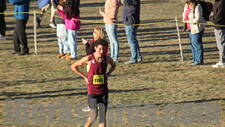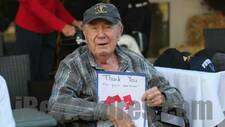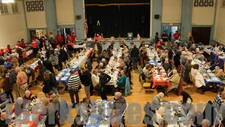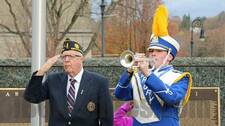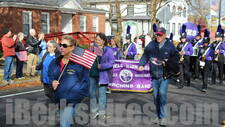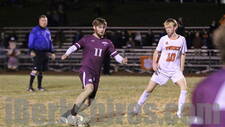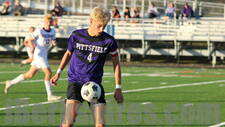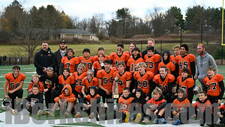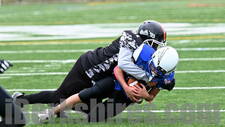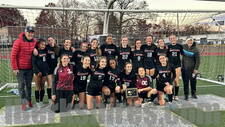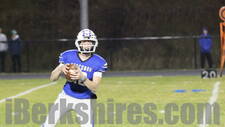"Memorial Day" By Williamstown Veteran's Agent Michael Kennedy12:00AM / Monday, May 29, 2006
 | | The bayonet, helmet, and boots represent military veterans who were killed during war. |
Introduction by Susan Bush
It was my intention to write something meaningful, something insightful and galvanizing, for this Memorial Day iberkshires homepage.
But after attending the Richard A. Ruether American Legion Post 152 ceremony at Field Park and hearing the words of Williamstown's former police Chief and current Veteran's Agent Michael Kennedy, I realized something: he said it all.
Memorial Day 2006
As Spoken By Michael Kennedy, Williamstown Veteran's Agent

Williamstown Veteran's Agent Michael Kennedy |
Memorial Day had special meaning to me. As the town's veteran's agent since 1998, I have a greater appreciation for our servicemen and women.
My current job has been a true eye-opener to the effects of war on those who participate in this man-made ritual of killing one another.
Today is not a day created for department stores and barbecues. It is a day when some quiet thought is called for. Today we should remember not the wars, but the those Americans who served in them. Some few were or are known to each of us as living flesh and blood. They have, over the years, been converted into statistics. While coldly stated, statistics do give us an important tool to measure things, provided they are accurate.
At least for the major conflicts of the past century, the ones whose human result I deal with daily, our government is giving us as official numbers those that are misleading when it unilaterally closes the books on a conflict loss rate and judges it to be over.
This system gives no accounting or recognition to the very long-term effects of war on veterans. Many die much, much sooner than they would have had they not been subjected to the lingering, fatal effects of war.
World War II
Let's begin with World War II and focus on some people that fought and survived that war's horrors.
The highest loss of any branch in the Navy; submarines in WWII suffered a 22 percent loss rate. They simply never returned. Here are some men who survived long service in submarines: John Gifford, USS Tarpon, George Guillotte, USS Pomfret.
Heavy bombers in Europe suffered from the highest loss rate of any of the services. Chances of completing 30 missions were 30 percent, or three out of ten. The average B-17 mission would consist of 10 men setting off in an aircraft called the 'flying fortress.' They were loaded with 27,000 gallons of gas and 4,000 pounds of bombs.
Flying over Nazi-occupied Europe at a little over 200 miles per hour, they were more like sitting ducks. Former town Selectman Louis DesCognets flew on the Schwienfurt mission in which 66 B-17s were shot down and another 50 were so badly shot up they would never fly again. Boudinot Stinson, a B17 pilot, was shot down on this mission to become a prisoner of war for the next year and a half. Stinson now rests in peace at Eastlawn Cemetery. Town resident John Neyland rests in peace at Westlawn [cemetery]. He was killed in a raid over Germany in 1943,
The largest branch of service in WWII was the U.S. Army. The infantry was only 10 percent of the overall Army. That 10 percent received 70 percent of the Purple Hearts issued to Army veterans.
Battle fatigue was considered to be a 'non-battle casualty.'Go figure, but it does help keep the score sheet down. In WWI it was called 'shell-shock.' The British called it 'cowardice.' They would execute a private or two every 10 days for such a heinous crime.
Today, we call this 'post-trauma stress disorder.'
Our history records the victories of our great military leaders - victories won with the blood of ordinary soldiers. Our history does not record the defeats of such great leaders. I quote historian and author J. Robert Moskin: "The deeds of our heroes are based, all too often, on the arrognace of higher authority."
I'll move on and make some comments on numbers in the Korean War, or 'police action,' as it was called. We entered the Korean War with a great American hero, Gen. Douglas MacArthur.
Korean War
In Korea, the United States suffered 33,741 battle deaths from June 1950 through August 1953.
General Douglas MacArthur, supreme allied commander, planned and executed great success in invading North Korea. His success was so brilliant that he ordered his victorious troops north to the Yalu River, which is on the border with China. As his troops ate Thanksgiving dinner in the hills of North Korea, he promised them they would be home by Christmas.
North Adams resident Darien Patton waved his American flag proudly at a North Adams Memorial Day parade. |
As usual, he was right.
Meanwhile, his commanders on the ground told him Chinese troops were on the ground.The 'supreme commander' scoffed at that and called them 'stragglers,' and ordered his troops rapidly north, so rapid as to fatefully outdistance their supply lines.
The rest should be history, but it's not.
On Nov. 25, the Chinese armies struck MacArthur's forces which were spread thin on the Korean peninsula well ahead of their supply lines. Winter had set in, temperatures were well below zero, and there were only six hours of daylight. A tactical blunder of enormous proportions when you consider that nearly half of the casualties suffered by U.S. forces came in the next month, the result of MacArthur's glorious drive to the Yalu River.
Our official history does not record what happened at the Yalu as a defeat. At the Chosin Reservoir, just south of the Yalu, the U.S. Marines suffered 4,500 battle casualties while another 7,300 men were incapacitated by frostbite; men whose fingers and toes would snap off like dry twigs. The strength of the U.S. Army Regimental Combat Team east of the Chosin Reservoir was 3,200 men. By December, only 385 of those men would escape to fight another day. On the eastern side of Korea, the 2nd Infantry Division of the U.S. Army was basically wiped out, with [over 4,000] men killed.
MacArthur himself would call this, likely the most crushing defeat in U.S. history, "the most successful and satisfying withdrawal I have ever commanded." He was speaking of the Marine withdrawal, failing to mention his 2nd Infantry Division of 5,000 who were wiped out.
The Chinese peasant army executed a perfect trap and a great victory, but we would not want to tarnish the great "American hero." Or, worse yet, let the American people know their sons were picked off like ducks in a shooting gallery.
Gen. MacArthur would soon be fired by President Truman. He would come to a ticker-tape parade. Many of his men would come home, as he promised, by Christmas, but they came, not to a parade, but home in a box.
The Department of the Army ROTC manual of American military history refers to this total defeat as a 'withdrawal,' nothing more, no numbers dead, wounded, or missing, a simple, sanitary 'withdrawal.' [ROTC 145-207]
Vietnam
In a little more than a decade conflict began in Viet Vietnam, another war we've 'closed the books' on, another forgotten war. It's Memorial Day.
We need to remember, at least today.
Long after the '10-Year War' officially ended in 1975, servicemen and women still die today. A grateful nation does not remember. I see through my office the effects that Agent Orange and combat have on many veterans. I often wonder, if the [U.S. Department of Veteran Affairs] veteran's administration has recorded that in Vietnam we had 47,000 plus battle deaths, how many veterans have expired since 1975 from exposure to Agent Orange?
There are no numbers; if there were, I feel those numbers would surely surpass the recorded battle deaths, which start in 1964, even though Americans started dying in 1959 in Vietnam.
Between 1959 and 1964, Americans killed in Vietnam did not make the official 'score sheet.'
As of 2004, the VA was only listing 10,000 plus veterans disabled by Agent Orange. Working with veterans with disabilities and the VA, I can understand that low figure.
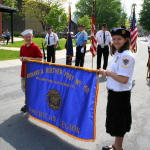
Amanda Gerry, 12, and Stephen Lane,11, led a Williamstown Memorial Day parade. |
The organization set up by the government to help veterans is in fact insensitive to those veterans. The average vet will become lost in red tape and bogus requests and will soon give up, thus the low numbers.
We need to remember these forgotten but still suffering vets.
Persian Gulf 1990-1991
The first Persian Gulf War, 1990-1991, is history, but not for those who fought in it. The United States suffered 147 battle deaths and less than 700 non-fatal woundings. Close the book and move to the next war - but it is not that easy.
The VA score sheet as of 2002 shows that of 600,000 plus troops in the Gulf War I, 159,238 were disabled. In 2002, 8,000 of those soldiers had died, a far cry from the official score sheet total of 147 dead.
No new 'scores' since 2002; one can only imagine.
These veterans are casualties of war but it is doubtful they will ever be listed as such. They will be forgotten in the same way Agent Orange vets have been forgotten.
Why so many disabled?
Maybe our use of depleted uranium on our artillery shells. Maybe the pills [not approved by the FDA] issued to troops to fight off anthrax and sarin gas. Maybe the ammo dumps blown up that sent large plumes of sarin gas into the atmosphere. These veterans are afflicted with neurological disorders and leukemia or brain cancer.
We need to remember these veterans. They are your neighbors, mailmen, co-workers and family members.
Uncle Sam may try to forget, we need to remember.
Before I close, I want to mention a few local veterans who have departed.
Familiar Names, Familiar Faces
Remember mild-mannered mailman Jim Meecham? Jim had three Purple Hearts, shot once, bayoneted once, and struck by shrapnel once.
How about Ernie Brundage - "Mr. Howard Johnson's" [Brundage owned a Howard Johnson's restaurant for many years]. Ernie was a crewman on a B-29 and on one particular raid, his plane was shot down. Ernie bailed out over Japanese-occupied China, narrowly escaping both death and the Japanese.
Cal King looked forward to today. He would be here with his two sons, who are veterans.We buried Cal nine days ago in Eastlawn [cemetery]. If he was here today, he'd tell you what color the water was off of Omaha Beach June 4, 1944.
Williamstown resident and U.S. Army Captain Adam Filson and WW II veteran and Richard A. Ruether American Legion Post 152 Commander Gary Walsh |
Today we need to remember our veterans who are with us in spirit but not in body. Surely WWII veteran Sinclair Hart is with us in spirit. Robert Diodatti is also absent today. Marc Jaffes absence here today is duly noted. Marc is one of the biggest combat veterans in town.
Our thoughts and prayers go out to them.
Last but not least: Staff Sgt. Lee Poulton, struck down in Germany by shrapnel, which is still in his body, is with us. His brother Arthur Poulton was killed on the very same day [that Sgt. Poulton was wounded]. A tough day for Mother Poulton, to be sure.
I will close now with this. Last week, a friend gave me a copy of some lines he'd seen engraved in a memorial chapel located inside Edinburgh Castle, Scotland. You may find, as my friend does, that they are a focus for thoughts on Memorial Days in Williamstown.
"They shall not grow old, as we that are left grow old. Age shall not weary them, nor the years condemn. At the going down of the sun and in the morning we will remember them." [known as "The Ode" and taken from English poet Laurence Binyon's poem "For the Fallen"]
That friend is a good friend, a very large soldier in his own right, Lt. John Winant, United States Marine Corp, bronze star....with a 'V' for valor.
Other veterans acknowledged by Kennedy during his speech include Keith Martelle, Jeff Kennedy, Jack Quinn, Charles Gray, Harold Marshall, Frank Scalise,Joseph Gerry and John Richards.
Susan Bush may be reached via e-mail at suebush@iberkshires.com or at 802-823-9367. |







